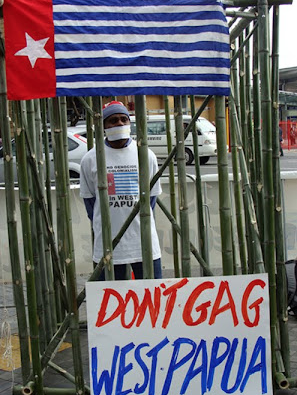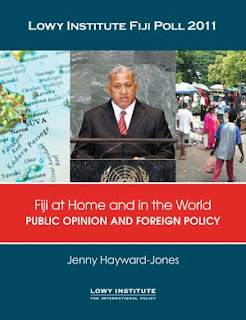By David Robie
The most astonishing unreported story in this week’s [9 September 2011] Pacific Island Forum in Auckland was a remarkable shift by the United Nations chief over West Papua. And the local media barely noticed. For all the hoo-ha about “converting potential into opportunity” at the predictable annual political talkfest, this was the most dramatic moment.
It was thanks to the probing of a young Papua New Guinean journalist studying in New Zealand who knew the right question to ask. But the significance was lost on local journalists — and even the Pacific and international journalists present. Secretary-General Ban Ki-moon suggested that the West Papuan issue should be discussed by the Decolonisation Committee of the United Nations General Assembly.
What? Coming in the wake of the Indonesian repression in West Papua throughout August in the face of a wave of unrest by Papuans more determined than ever for self-determination, this was almost unbelievable.
Question: [unclear] With regards to human rights – for more than 42 years, there’s a struggle in West Papua as people seeking their [own] government in the province of West Papua.
What is the United Nations stand on that?
BKM: This issue should also be discussed at the Decolonisation Committee of the United Nations General Assembly. And when it comes again, whether you are an independent state or a non-self-governing territory or whatever, the human rights is inalienable and a fundamental principle of the United Nations.
We will do all to ensure that people in West Papua, their human rights will be respected.
Question: Does a human rights fact-finding mission has be dispatched to West Papua at some time?
BKM: That is the same answer [to a previous question on Fiji] that should be discussed at the Human Rights Council amongst the member states.
Normally the Secretary General acts on the basis of a mandate given by inter-governmental bodies.
Because journalist Henry Yamo’s question was overshadowed by queries about Fiji, it probably slipped below the media radar. Was it a slip-up that officials were keen to brush aside? However, NGOs such as the Auckland-based Indonesia Human Rights Committee were quick to seize on the moment. Overnight a media declaration was produced by 15 Australian and NZ NGO signatories with the help of four West Papuans being hosted on the AUT University marae.
They called for the UN Secretary-General to:
- appoint a Special Representative to investigate the situation in West Papua – to review the circumstances and outcome of the 1969 ‘Act of Free Choice’, as well as the contemporary situation; and
- use his good offices to persuade the Indonesian government to allow free access to West Papua for media representatives from the international community and for non-governmental human rights organisations.
The statement also called on the Pacific Islands Forum to:
- send a fact-finding mission to West Papua to investigate the human rights situation;
- support the West Papuan people in their call for peaceful dialogue with the Indonesian government;
- grant observer status to West Papuan representatives who support the people of West Papua’s right of self-determination; and
- recommend to the United Nations General Assembly that West Papua be put back on the agenda of the Decolonisation Committee.
But the Forum simply ignored the West Papua issue.
In spite of a West Papuan protest outside the Forum opening and later at the summit hotel, the local media were only interested in a parallel protest against the Fiji military regime and the Forum communiqué failed to mention West Papua. Hypocrisy. While the Forum has already welcomed New Caledonia and French Polynesia as associate member status, and Timor-Leste (another former Indonesian former colonial possession) as an observer and is now granting American Samoa the same privileges, it remains silent about the atrocities and human rights violations in a Melanesian territory of the Pacific.

At the West Papuan protest, Green MP Catherine Delahunty grabbed a protest placard and tried to attract the interest of Pacific delegates in the plight of the Papuans. A gagged young man who was symbolically “locked up” in a bamboo cage, also had a story to tell. He was Amatus Douw, one of 43 Papuan political asylum seekers who fled to Australian in 2006. The other marae-based activists were Dr John Ondawame (West Papua People’s Representative Office in Vanuatu); Rex Rumakiek (secretary-general of the West Papua National Coalition for Liberation – WPCNL); and Paula Makabory (Institute of Papuan Advocacy and Human Rights – IPAHR).
The absence of West Papua from the final communiqué was not the only blot on the Forum’s outcomes. While New Zealand was busy talking up the success of the Forum — “[Murray] McCully scores with his A-list forum”, as the New Zealand Herald billed it — most social justice and human rights issues were sidelined. There were structural problems too.
Violence against women
Although the issue of Sexual and gender-based violence against women was cited in the communiqué again this year, it was remarkable that media took little notice. Amnesty International collected a petition of 21,000 signatures and to his credit, President Anote Tong, accepted this while no other Pacific leader did.
But the media took even less interest, apart from reports by the student journalist team from Pacific Scoop. Jocelyn Lai of the Young Women’s Christian Association spoke harrowing tales and provided case studies of violence against women and girls in the Solomon Islands, a culture of silence and impunity because of the stigma. A report about Solomon Islands slums denied sanitation and safety was devastating, yet no SI journalist turned up for this let alone any other Forum journalists. Two thirds of women and girls aged between 15 and 49 had experienced physical or sexual violence from their partners and other family members.
In fact, the Forum’s engagement with civil society was dismal. While Pacific leaders recognised in the communiqué many of the issues identified by civil society were ones already on the regional agenda. There is still much rhetoric and not enough action. Female representation, or rather lack of it, is nothing short of “scandalous”. Move over Gulf Arab states, the Pacific is far worse. Six out of the world’s 10 countries without female representation are in the Pacific.

Little will change politically in the Pacific region without more women and greater diversity in the parliamentary representation. Yet women’s and other civil society groups were largely marginalised, if not actually excluded, by the Forum establishment elite. Next year in the Cook Islands an actual “dialogue” is needed between the region’s political leaders and the NGOs.
Think tank excluded
An independent think tank, the Pacific Policy Institute based in Vanuatu, was actually excluded from the Forum. While the conservative Australian-based Lowy Institute enjoyed a privileged position, including having a day-long conference in an Auckland hotel just two days before the Forum opened and had the opportunity to launch a controversial Fiji opinion poll, its opposite number — a real Pacific think tank, was being denied any accreditation.
It is believed that this is because of its policy on Fiji where it seeks “positive engagement”.
The Forum wasn’t all negative by any means. It certainly put the “Pacific” of Aotearoa on a world map with the presence of UN and European Union at the top level — plus the largest Chinese and US delegations — in a manner that has never been achieved previously in four decades of leader summits. The opening Pacific Showcase at the Cloud on Queens Wharf is a drawcard. And NZ Minister of Foreign Affairs Murray McCully can take the credit for this.
Also some NGOs welcomed the “responsiveness” of Forum leaders to climate change needs, civil society involvement in the future and the UN Arms Trade Treaty. Trade still remains a problem – it has been a very thorny issue in the past — and while Fiji will now be allowed back into the Pacer Plus (a pragmatic decisions based on necessity rather than any “softening up” of policies by Australia and NZ), negotiations are still likely to be delicate. Fiji has achieved some diplomatic successes in recent months and may force Australia and New Zealand to take a more pragmatic line rather than leaving a regional political void to China.

